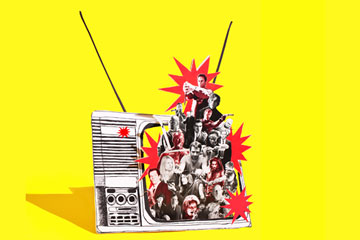
(2 of 3)
Violence is your grandma's entertainment and your nephew's. What they see is life as a relentless struggle and their fellow man as their potential executioner. Whether in suburbia or in 1920s Atlantic City or in a fantasy kingdom, people want what they want and are glad to build their dreams on a pile of skulls.
Why has TV drama become so reflexively brutal? For some of the same reasons it has become so good. Post-Sopranos cable is frequently as daring and rich as the best movies because its creators are free--free of limits on language and gore, free of having to make protagonists likable, free to kill off characters, free to break rules (and fingers). But not free of ratings pressure. Basic-cable networks have to chase the viewers advertisers pay for, particularly young men. What gets their attention are life-and-death stakes. "There's a network buzzword for it. They like things to be 'noisy,'" says Sons of Anarchy creator Kurt Sutter. "There's just that need to say, 'Hey, look at me! Look over here! Watch this!'"
TV is changing and audiences are shrinking, which is a reason a show like Sons can survive: 5 million or so viewers make it a hit in the era of fragmentation. At root, it's a complex, thoughtful drama about the biker-gang subculture and the way moral debts are paid down through generations. But it has to constantly one-up itself to hold its intensity-minded audience. In last year's season finale, one character (played by Sutter himself) bit off his own tongue and spit it out to avoid interrogation.
Sutter based the show's family struggle on Hamlet, and as FX president John Landgraf notes, even Shakespeare was not above a good eyeball-gouging. With intense dramas like Sons, Justified and The Americans, FX has aimed for a balance of prestige and pulp to court a wide range of ages and tastes. "I'm 50 now," says Landgraf. "I watched Amour"--the Oscar-nominated chamber piece about an elderly couple--"and I found it fascinating. It doesn't deal with violence, but it deals with death and loss. But when I was 25, I wouldn't have been interested in Amour. I would have been interested in Batman."
Whatever the commercial motives, TV is capable of handling mayhem intelligently, even artistically. Because it's a serial medium, it can show how violence's effects linger beyond the end of an episode. The fallout of a cop-on-cop murder in The Shield drove the whole series. On Sons of Anarchy, the rape of the protagonist's mother had emotional repercussions that echoed for an entire season. Maybe the greatest character on Game of Thrones, an unblinking study of cruelty and power, is Arya, who attends her father's execution, witnesses the torture of captives and hardens slowly before our eyes into a coal of vengeance. Shows like these do death the honor of recognizing that it is permanent, even for its survivors.
